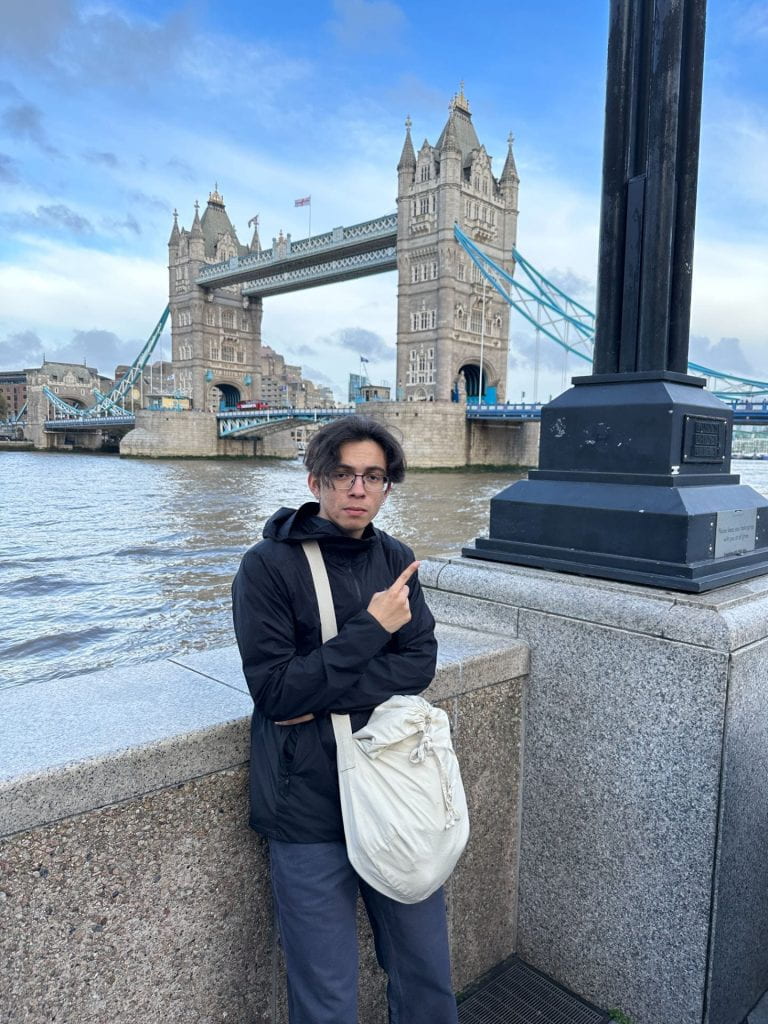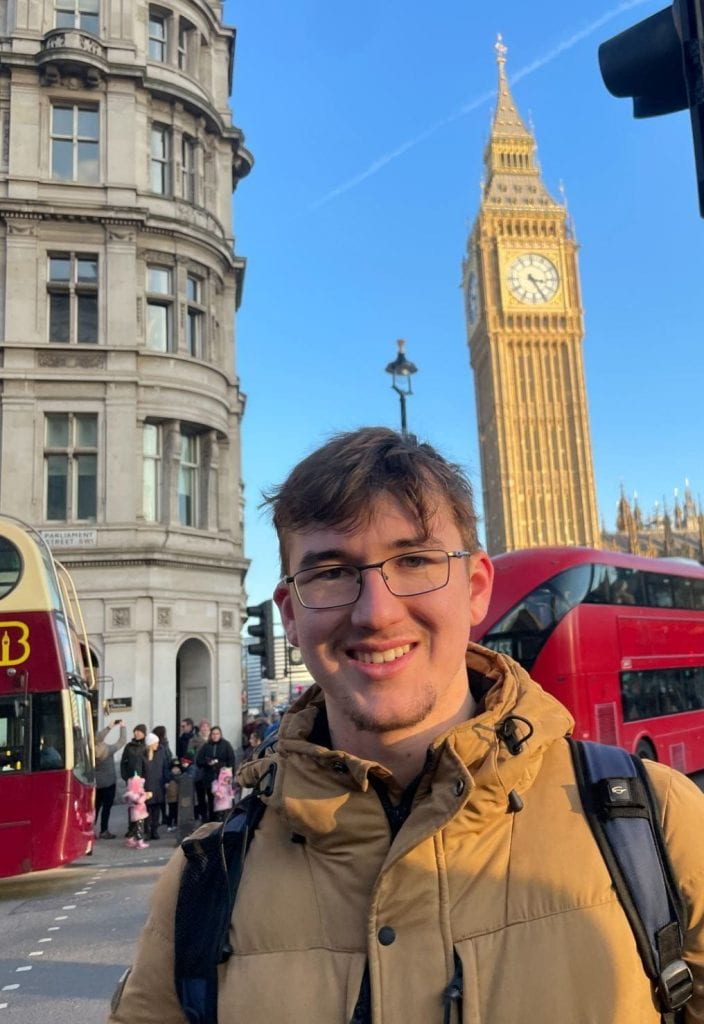
 MAJOR: Kinesiology
MAJOR: Kinesiology
PROGRAM: SJSU Exchange – University of Birmingham
EMAIL: luis.f.torres@sjsu.edu
BIO: My name is Luis Torres and I am a third year majoring in Kinesiology with a specialization in exercise and fitness. I am a first generation college student that has lived in Mexico and the US. Studying abroad was something that I was interested in even before entering SJSU. My sister had studied abroad in Spain when she was a student and I remember her telling me how it made a positive impact on her life. When I was in my second year at SJSU I met a Japanese exchange student and she told me the same; studying abroad was something that everyone should get the chance to undertake. So I decided to take a dive into the unknown and immerse myself in a new culture. I chose the UK because I wanted to go to the hub of all things related to soccer. Being a Kinesiology major, I want to work with a professional soccer team in the future. I also wanted to experience independence while abroad. Finally, studying abroad allowed me to travel outside of my host country and experience a myriad of other cultures. It was very interesting to see different cultures and their perspectives on life.
GOALS: One of my personal goals was to become more independent and I also wanted to find myself while I was surrounded by a new culture. I was able to achieve this as I had much more on my plate than I would if I was at SJSU. I had to balance cooking, cleaning, studying, commuting, traveling and hanging out with friends. I believe I was able to effectively manage my tasks. I also feel that I was able to reflect on myself and who I want to become in the future. My academic goals included passing all my classes with good grades. I put a lot of time and effort into my studies and I feel that I was able to adapt to the teaching styles in the UK. My professional goals included securing an internship with a professional soccer team. Unfortunately I was not able to participate in an internship, however I did make a lot of connections with people in the field of athletic development and recovery. I was able to chat and connect with professors that had coached professional sports before they became lecturers. I also had the opportunity to participate in a research study in which I learned methods in data collection and interpretation.
PERSONAL GROWTH: The friends I made during my exchange made the biggest impact on my life. We only got to know each other for a few months but now it feels like I have known them for a lifetime. The dynamic between people from different countries made it easier for me to open up to others as well as reflect on what kind of person I wanted to be. I was able to make friends from all around the globe and I know we will keep in touch for many years to come. Since most of my friends were also exchange students, we navigated through similar obstacles. At the end of the day, it was comforting to know I had friends I could count on with whatever problems I had going on. I will never forget the countless nights we spent chatting and unwinding after a long day of lectures.
ACADEMICS: How would you describe your academic experience abroad? I had heard that curriculum in the UK was centered around the learner going beyond lecture content. I experienced first hand how important it was to constantly read articles, papers and other sources in order to further develop what was being taught in the lectures. For example, I took a module called Control of Human Movement which was very content heavy. It expanded upon classes I had taken at SJSU so some of the content was familiar. However, since it was content heavy, I had to spend a large amount of time outside of class studying and researching the topics we covered in the lectures. I spent a lot of time reading after lectures and going to office hours in order to make sure I was ready for assessments. I took 2 other courses called Introduction to Teaching and Coaching and another called Movement and Learning. These 2 courses relied heavily on practical applications and group work. Whatever was taught in the lecture was expected to be expanded upon by the students during practical and seminar sessions. These sessions revolved around taking theory and putting it into a real situation. We were often expected to come up with coaching plans for a large variety of age ranges. I would need to read extra material before these sessions in order to be prepared to defend my stance and techniques I applied within the coaching plans. We learned how to incorporate teaching and leadership styles in order to create a streamlined, inclusive, and fun environment in which learners were holistically introduced to activities. The point of these sessions were not only to develop physical literacy but also reflect on social, emotional, and personal skill development. One thing that took some time getting used to were the expectations for students. UK education relies heavily on students to prepare themselves for exams and essays. There is little to no homework so it is of utmost importance to keep up with lectures and study a lot. Typically, grades are based on only a midterm and final exam which was different from what I was used to at SJSU.
CAREER: What skills did you learn / sharpen during your study abroad experience? One of the most important skills I had to develop was time management. The curriculum in the UK is centered around the learner taking initiative and expanding on the content taught in school. This means that I had to manage my time effectively to balance schoolwork, researching, and studying. It is necessary to go the extra mile and research content that facilitates the understanding of lectures, seminars, and practicals. It is also important to keep up with the material that is being taught and study it consistently. I was also able to network with professors, researchers, and students. The professors and researchers I talked with were all in the field of athletic development. To me, they were highly useful in the sense that I was able to get a new perspective as to how sport is viewed in a different country. I was also able to network with classmates that had connections to professional sport organizations in England. Ultimately, studying abroad has opened a new door for my professional goals.
COMMUNITY ENGAGEMENT: How has your immersion impacted your perspectives on the world? In the UK, I noticed there are a lot of similarities with US culture. However the main difference is that people are more open to conversations. I could easily strike a conversation with a stranger on the train, grocery store, or cafe. It has helped me to become more open to talking and meeting new people. When I visited Denmark and Germany, I noticed how everyone was courteous in following rules and etiquette. Thanks to my exchange I have gained a more positive aspect of humanity. Most people are honest and are just trying to live a good life. I also realized that discrimination based on race was not really prevalent. Within the university, there is an extremely strong bond between professors and students. Both parties see each other as equals rather than the professors having power over everyone else. One thing that shocked me was that all professors preferred to be on a first name basis with the students. Even professors that had doctorates preferred to be addressed with their first name, which to me helped facilitate a deeper relationship with them.
FUTURE: How has study abroad prepared you for your future? As globalization continues, all of us need to make the effort to understand people who come from different backgrounds. We need to appreciate other cultures and learn what we can from them. Study abroad has helped me access opportunities I would not have if I had stayed in the US. I feel as if I am more prepared to enter the workforce due to my experiences shaping my professional, academic, and personal development. I understand what it means to play your own part but also be able to rise to any occasion and take initiative.
TIPS: What advice would you give to future Global Spartans? To anyone considering studying abroad I would say just do it. Of course, one can feel anxious stepping outside of their comfort zone and entering a new environment. Making the choice to study abroad is the hardest part, everything else will come naturally and flow easily. You will get more positives than negatives and it will change your life forever. It is okay to feel nervous, but you have to understand that many more people are in the same boat as you and you are never alone. There are counselors available to answer any questions. The people you meet abroad will be people you will never stop thinking about. All the memories you make will be vivid, you will also be able to set yourself apart from others when you come back. The development I went through during these last few months would not be possible without my exchange.
